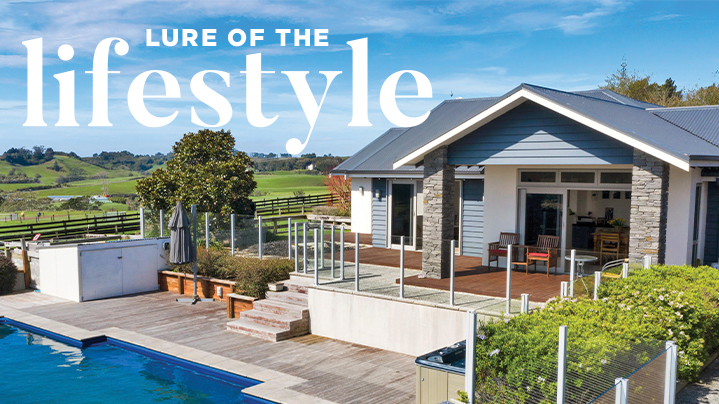Lure of the lifestyle
In a world full of choice, where more agile working environments offer greater flexibility to workers, residential choices are increasingly dictated by social and lifestyle factors. Vanessa Taylor, spokesperson for realestate.co.nz discusses the trends driving residential sale decisions in the wake of COVID-19.
While crystal ball gazing early in the pandemic saw commentators anticipate a shift towards larger, more spacious homes with greater importance placed on land and lifestyle, Bayleys asks whether property prophecies have come true?
“Informed by the experience of COVID-19, residential property preferences are shifting, as more Kiwis put stock into the lifestyle factors affecting work, family and leisure,” says Vanessa Taylor, spokesperson and general manager of marketing and media for realestate.co.nz.
An interesting result of the extended lockdown period has been New Zealanders becoming more reflective of their housing situation.
Shifting focus
The last three months have shown many rural areas to achieve record median sale values, according to data from the Real Estate Institute of New Zealand (REINZ).
A combination of record low interest rates, easing monetary policy by way of the removal of loan to value restrictions (LVRs), and the desire for people to upsize or find more room to grow/a bigger backyard has had a meaningful impact on the recent performance of the residential market.
“Our data shows a significant increase in the number of people searching for four-plusbedroom homes,” says Ms Taylor.
“Typically, three-bedroom homes tend to be the most popular property type but interest in larger homes is steadily increasing, and it’s fair to assume people are searching for a flexible fourth bedroom to accommodate a working from home situation,” she adds.
“What we’re seeing across the market and from our social media platforms is that COVID has caused Kiwis to reassess their priorities when it comes to housing.”
“New Zealanders are either counting their blessings for the home they’re in or looking to trade up, and with more businesses adapting to flexible working hours and lesser necessity to commute, people are more open to living further away in more built-up urban areas.”
“New Zealanders are either counting their blessings for the home they’re in or looking to trade up, and with more businesses adapting to flexible working hours and lesser necessity to commute, people are more open to living further away from built-up urban areas,” Ms Taylor says.
“We are seeing this social behaviour exemplified through the data,” Ms Taylor says.
Property continues to sell particularly well in pockets of Northland, the Central North Island and the Coromandel where prospective purchasers may be searching for a reprieve from the city or second/holiday home, with momentum unlikely to slow as we approach warmer summer weather.
Anecdotal evidence suggests more apartment owners are looking to trade up after spending time in smaller spaces during the last lockdown. While first home buyers and renters are more eager to use this time and the opportunities afforded by the economic climate to put their savings to use and step onto the property ladder.
Extra interest
While data from the REINZ for the three months to August 2020 showed there were 556 more transactions of lifestyle property when compared year-on-year, Ms Taylor says lifestyle listings on realestate.co.nz were actually down year-on-year, reflecting greater tightness across the marketplace.
“The average asking price for lifestyle-type property across New Zealand was up 8.2 percent this September compared to last, which is in line with residential value growth across the market,” she says.
“Property continues to sell particularly well in pockets of Northland, the Central North Island and the Coromandel where prospective purchasers may be searching for a reprieve from the city or second/holiday home, with momentum unlikely to slow as we approach warmer summer weather,” Ms Taylor says.
“Property continues to sell particularly well in pockets of Northland, the Central North Island and the Coromandel where prospective purchasers may be searching for a reprieve from the city or second/holiday home, with momentum unlikely to slow as we approach warmer summer weather,” Ms Taylor says.
One of the most influential factors right now is simply greater public interest in the residential market, Ms Taylor says.
When comparing visitor numbers to the website this September, enquiry was up a whopping 88.8 percent - a trend Ms Taylor says has kept pace since New Zealand scaled down the alert levels back in May.
“We’re seeing rising interest, with an increase in the total pool of people searching for residential property. Our data shows a year-on-year uplift of between 25 and 30 percent.”
“People are more engaged as well, with the total time spent on the website searching for residential property increasing to 11 and a half minutes – a huge number when you think about the amount of virtual information we can digest so quickly.”
Supply and demand
While the property market is buzzing at the moment, Ms Taylor says the biggest challenge remains the availability of stock. “Until New Zealand shifts focus to how we can better invest and build smarter, I think supply is going to remain an issue.”
“We need to be able to increase the volume of houses built every year and I think COVID (while our borders are closed) is providing us with an excellent opportunity to replenish the market and scale up our building operations to keep pace with demand.”
In the absence of one-size-fits-all trend analysis, Ms Taylor believes that COVID has changed our view on property and lifestyle, and she says, this event is more personal with some households choosing to downsize for financial reasons, while others trade up, taking advantage of record low interest rates and easing monetary policy.
Vanessa Taylor is the spokesperson and general manager of marketing and media for New Zealand’s longest-standing property platform realestate.co.nz.
Read more...
[Download PDF]